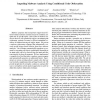Free Online Productivity Tools
i2Speak
i2Symbol
i2OCR
iTex2Img
iWeb2Print
iWeb2Shot
i2Type
iPdf2Split
iPdf2Merge
i2Bopomofo
i2Arabic
i2Style
i2Image
i2PDF
iLatex2Rtf
Sci2ools
129
click to vote
NDSS
2008
IEEE
2008
IEEE
Impeding Malware Analysis Using Conditional Code Obfuscation
Malware programs that incorporate trigger-based behavior initiate malicious activities based on conditions satisfied only by specific inputs. State-of-the-art malware analyzers discover code guarded by triggers via multiple path exploration, symbolic execution, or forced conditional execution, all without knowing the trigger inputs. We present a malware obfuscation technique that automatically conceals specific trigger-based behavior from these malware analyzers. Our technique automatically transforms a program by encrypting code that is conditionally dependent on an input value with a key derived from the input and then removing the key from the program. We have implemented a compiler-level tool that takes a malware source program and automatically generates an obfuscated binary. Experiments on various existing malware samples show that our tool can hide a significant portion of trigger based code. We provide insight into the strengths, weaknesses, and possible ways to strengthen...
Related Content
| Added | 01 Jun 2010 |
| Updated | 01 Jun 2010 |
| Type | Conference |
| Year | 2008 |
| Where | NDSS |
| Authors | Monirul I. Sharif, Andrea Lanzi, Jonathon T. Giffin, Wenke Lee |
Comments (0)

